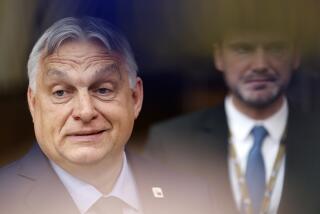Cosmetic Changes at Top Will Not Likely Blush Over Angry Mood of East Europe
- Share via
It’s one down, four to go.
While he remains the titular head of state, Czechoslovakia’s Gustav Husak resigned as party chief last week. He is but the first old-fashioned East European leader to be pushed aside since Mikhail S. Gorbachev came to power in Moscow in 1985.
Within another year or two, four other leaders--Hungary’s Janos Kadar, Bulgaria’s Todor Zhivkov, East Germany’s Erich Honecker and possibly Romania’s Nicolae Ceausescu--are expected to follow suit.
The changing of the guard in Eastern Europe has something, but not much, to do with the leaders’ old age and poor health. True, Husak, Kadar, Zhivkov and Honecker are 75. Ceausescu is 69. All are ailing. But in the world of Communist Party politics no one resigns for reasons of age or health alone.
Husak’s demotion is due to Soviet pressure and to economic stagnation in Czechoslovakia itself. Put into power by Leonid I. Brezhnev and late to join the Gorbachev bandwagon, Husak has presided over his country’s decline for almost two decades.
Even by comparison to the Soviet Union, Czechoslovakia, as one of my interlocutors in Prague put it earlier this year, is a “vast political cemetery.” One of the world’s six or seven most advanced industrialized countries before World War II, it is today the single most vivid symbol of the failure of Soviet-type economic systems. In almost every respect Czechoslovakia lags behind all of its Western European neighbors and even such countries as South Korea, Singapore and Taiwan.
Husak has been allowed to keep his ceremonial post as president and Milos Jakes has been chosen as head of the party in order to provide for a measure of continuity. Jakes, 65, is only slightly younger and only slightly more pragmatic than Husak. Hence the main reason for Jakes’ promotion is that he embraced Gorbachev’s program of perestroika a few months before Husak and most of his colleagues did. Jakes’ ties to Moscow in general and to the KGB in particular are also presumed to be close. In the 1960s Jakes served as deputy head of the Ministry of Internal Affairs, whose task is to supervise Czechoslovakia’s notorious secret police.
Even under this transitional leader, Czechoslovakia is headed for instability. The leadership is still divided, and the people long for both democracy and higher living standards. Indeed, Gorbachev’s dilemma throughout Eastern Europe is how to make change without creating instability. Change is needed to effect improvements; stability is needed to maintain party control.
But in Eastern Europe, more so than in the Soviet Union itself, change entails the risk of generating upheavals. This is a volatile region. More than four decades of communist rule notwithstanding, most East Europeans admire the Western world, not the Soviet Union. In recent months workers in Hungary set several factories on fire; in Romania they ransacked party headquarters in the city of Brasov; in Poland the relative apathy of the last few years is giving way to a mood of renewed activism.
The growing assertiveness of some workers is best reflected in a two-page exchange of questions and answers published in the Sept. 12, 1987, issue of a Hungarian provincial party daily newspaper called Dunantuli Naplo. The answers that were given by Janos Berecz, a Politburo member and potential successor to Kadar, were standard party fare. But the questions that were posed to him by the “Workers of the Mecsek Coal Mines,” and printed in this official paper, reveal the issues that are preoccupying Hungarian and presumably other Eastern European workers at this time.
“With workers bearing the brunt of the economic crisis,” went one question, “why aren’t those incompetent leaders brought to account who squandered away (Hungary’s Western debt of) $15 billion?” Another question was this: “How come the socialist countries are getting poorer while nonaligned Austria and Finland have been getting richer?” The most provocative question was left to the end: “Last but not least, if the party and the government are so sure that they enjoy the confidence of the people, why don’t we have free elections under international supervision?”
The angry mood of Eastern Europe cannot be appeased by the kind of cosmetic personnel changes that Prague announced last week. It is in Moscow’s self-interest to apply a larger dose of Gorbachev’s “new thinking” to Eastern Europe--before another uprising and subsequent crackdown rock the Soviet Bloc.
Better yet, President Reagan should make Eastern Europe one of the regional issues to be discussed at next year’s summit meeting in Moscow--before another East European upheaval would threaten to nip U.S.-Soviet detente in the bud.
More to Read
Sign up for Essential California
The most important California stories and recommendations in your inbox every morning.
You may occasionally receive promotional content from the Los Angeles Times.










